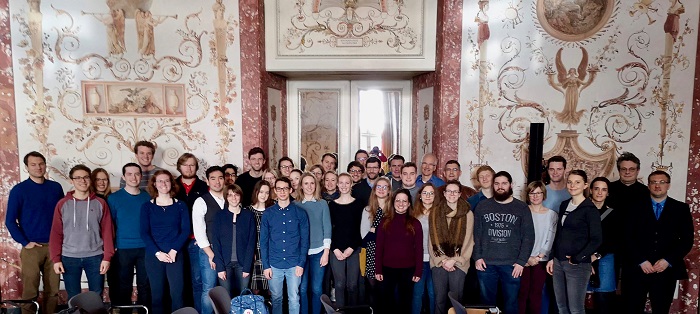Research impressively presented
What influence will Artificial Intelligence (AI) have on everyday medical life in hospitals and practices, on doctor-patient communication and on patients and their family environment? At the beginning of the Winter School, the students of the Elite Graduate Program "Translational Medicine" presented their findings to these questions in short lectures showing very diverse examples. It became clear - AI is already available for doctors and patients and it will clearly gain influence.
Today, cancer diseases are being treated in an increasingly individualized way dependent on their underlying genetic changes, for example. Prof. Peter Wild from the Senckenberg Institute of Pathology in Frankfurt demonstrated how this could be achieved by pattern recognition using AI in the treatment of prostate carcinomas. It seems possible to identify the genetic changes underlying the tumor from histological sections of biopsies, which allows a more comprehensive and cheaper diagnosis.
Diagnoses from the "black box" of an AI system inevitably lead to the question: Who is liable if mistakes are made when a doctor uses AI? Prof. Eric Hilgendorf from the Faculty of Law in Würzburg used a wide variety of case scenarios to stimulate discussion, but also to provide food for thought.
The more fundamental question "What is AI?" was addressed by Rüdiger Pryss, Professor of Medical Informatics at the IKE-B in Würzburg. There are very different ideas about AI in society. In his lecture Prof. Pryss showed what is behind AI and how it can be developed. Using the example of chatbots he showed how difficult it is to program them in a such a way, that they could at least partially be used in doctor-patient communication.
At the end, Prof. Peter Krawitz (University of Bonn) demonstrated that in the case of developmental delays in infancy, possible causal hereditary diseases can already be assumed on the basis of a facial photo of the child. Such suggestions can already provide valuable additional information for the correct recognition of syndromic diseases.
Leap in time in the supporting program
The rococo style Tuscany Hall provided an impressive backdrop and special atmosphere for the Winter School - and a contrast to the Winter School's future-oriented themes. In the directly adjacent Martin von Wagner Museum of the University, the presentation of anatomy in different epochs was of particular interest to the students during a short tour. Nevertheless, the basic theme of the Winter School was also retained here: How can we let pictures speak to us or decipher the messages hidden in them.
Text: Dr. Stefanie Steinhauser, Elite Graduate Program "Translational Medicine"


